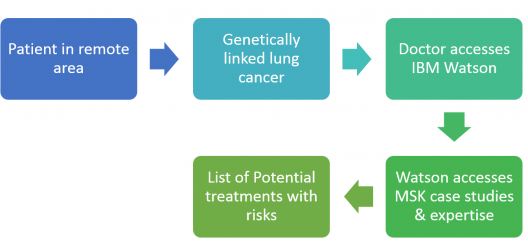PySpark Certification Training Course
- 12k Enrolled Learners
- Weekend/Weekday
- Live Class
Healthcare data is among the most complex and voluminous data produced in the world today. Lying among this huge pile of healthcare data are precious insights that can directly impact and improve the quality of human lives. While we lacked means of analyzing this data until as recently as a decade ago, progress in Big Data Analytics has made Healthcare Analytics a distinct reality today!
In this blog post, let us examine the problems that Big Data analytics can solve in the healthcare domain. Let us also look at a few case studies of the application of Big Data Analytics in healthcare and the tools that are used. Before we begin with the article, learn all about Big Data from the Hadoop Certification
The foremost benefits of applying Big Data analytics in healthcare are:
The advent of wearable devices has made collection of healthcare data easier than ever before. From tracking of fitness data to geriatric care and intensive care, wearable technology has revolutionized data collection in healthcare. In fact, Global Connected Health Market 2016-2020 report forecasts the global connected health market to grow at a CAGR of 26.54% during the period 2016-2020!
The data so collected can be stored using Hadoop and analyzed using MapReduce and Spark.
One of the most well-known implementations of Big Data in Healthcare in recent times is IBM Watson, a powerful cognitive computing platform for healthcare analytics. It is equipped with natural language capabilities, hypothesis generation, and evidence-based learning to support medical professionals as they make decisions. You can even check out the details of Big Data with the Data Engineering training
This is how a physician can use Watson to assist in diagnosing and treating patients:
Step 1: Physician poses a query describing symptoms of the patient and related factors.
Step 2: Watson parses the inputs by mining available patient data for relevant factors such as family health history, medications, test reports etc. and also considers doctor’s notes, clinical studies, research articles and other such data.
Step 3: Watson puts out a list of diagnoses with corresponding scores that indicate the confidence level for each hypothesis. This helps the doctor — and patient — make more informed and accurate decisions.
One of the well-known applications of IBM Watson has been the ‘Watson for Oncology’ application which IBM developed in partnership with New York’s Memorial Sloan Kettering Cancer Center (MSK).

The significance of this app is far-reaching as any doctor from anywhere in the world can access the app by just getting a license for the program and give their patients access to world-class cancer treatment. Such is the magic of healthcare analytics born out of access to Big Data in healthcare! You can even check out the details of Big Data with the Data Engineering Certification in Pune.
Hadoop is the underlying technology that is used in many healthcare analytics platforms. This is because, Apache Hadoop is the right fit to handle the huge and complex healthcare data and effectively deal with the challenges plaguing the healthcare industry. A few arguments for using Hadoop to work with Big Data in Healthcare are:
Currently, 80% of all healthcare information is unstructured data. This includes physicians’ notes, medical reports, lab results, X-ray, MRI images, vitals and financial data among others. Hadoop provides doctors and researchers the opportunity to find insights from data sets that were earlier impossible to handle.
Most healthcare organizations can store no more than three days’ worth of data per patient, limiting the opportunity for analysis of the produced data. Hadoop can store and handle humongous amount of data, making it the ideal candidate for the job.
Hadoop helps researchers find correlations in data sets with many variables, a difficult task for humans. This is why it is the right framework to work with healthcare data.
Here is a demo for the application of Big Data Analytics in healthcare. This MapReduce demo will help you write a program that can eliminate the duplicate CT scan images from a database of 100 million images. The step-by-step procedure, approach and solution can be found in this video tutorial.
This is just one of the many instances where Big Data analysis has helped solve major healthcare problems and contributed to effective detection and prevention of diseases. Hadoop is extremely relevant in the analysis of humongous data sets for prevention and timely treatment of chronic diseases. There is a huge untapped opportunity in the usage of Big Data Analytics in healthcare and the time is right for Hadoop professionals to step up and take on the challenge!
Edureka has a live and instructor-led course on Big Data & Hadoop, co-created by industry practitioners. Learn more from the Big Data Training in Chennai.
Got a question for us? Please mention it in the comments section and we will get back to you.
Related Posts:
 Thank you for registering Join Edureka Meetup community for 100+ Free Webinars each month JOIN MEETUP GROUP
Thank you for registering Join Edureka Meetup community for 100+ Free Webinars each month JOIN MEETUP GROUPedureka.co